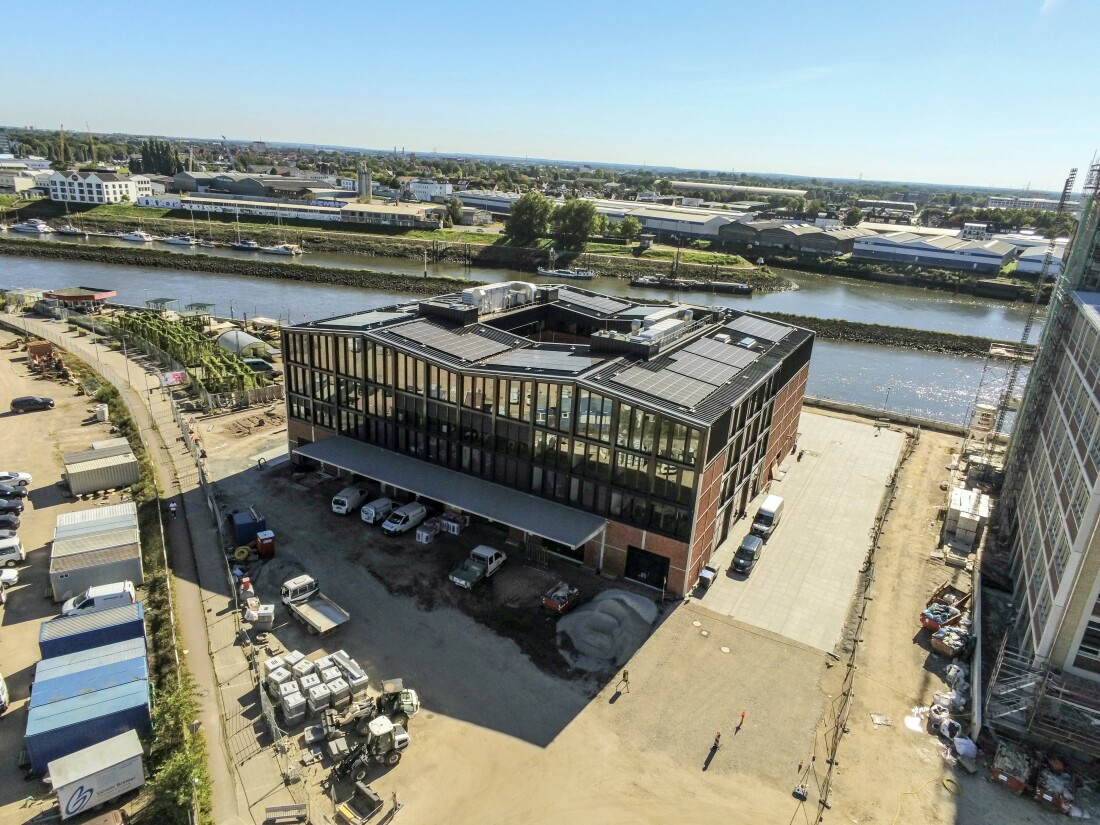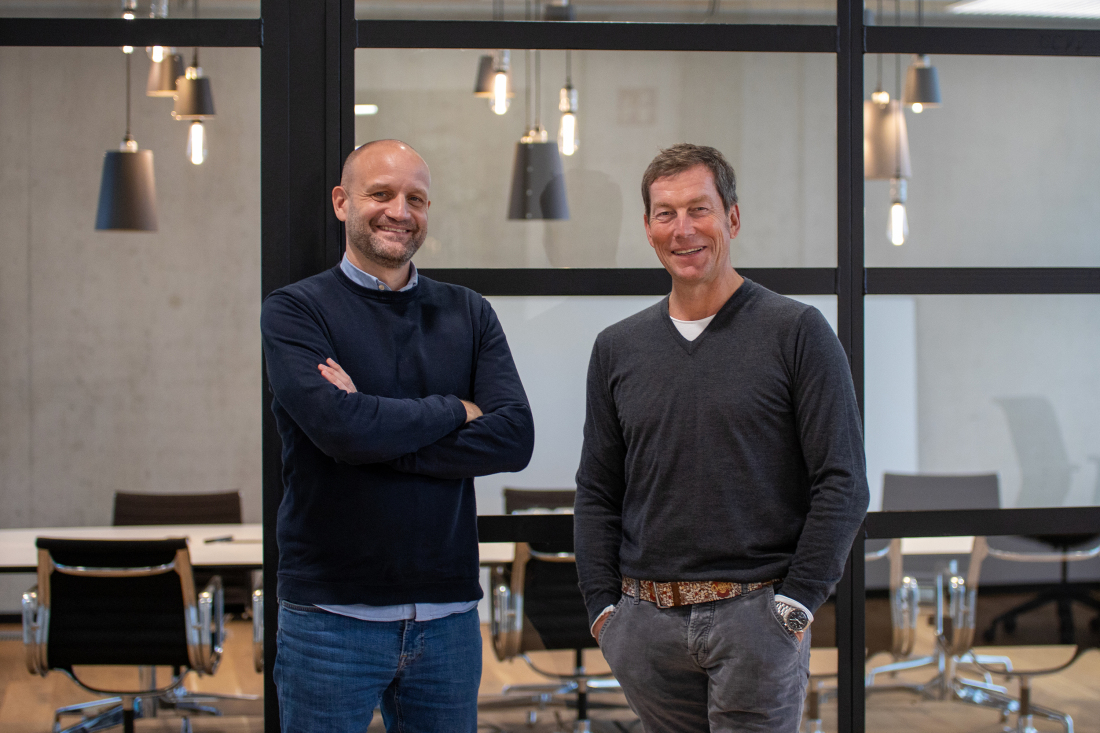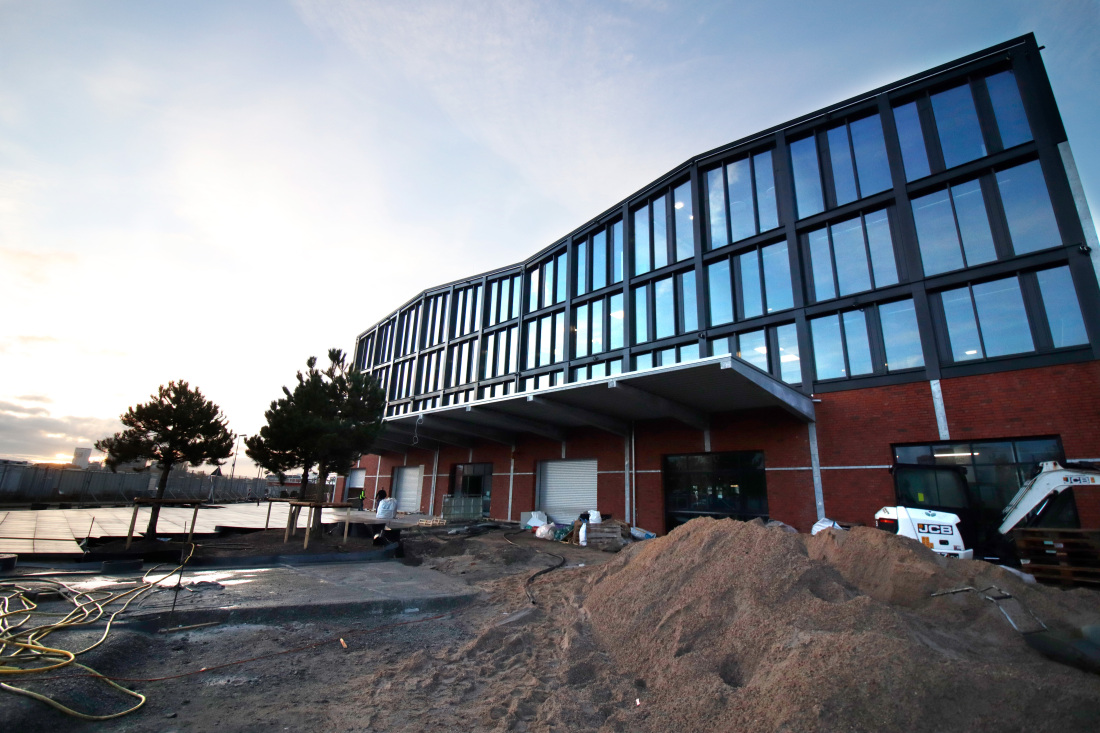Brüning Group: From Fischerhude to the Überseeinsel
Überseestadt (New Harbour District)New settlement on the former Kellogg's site in Bremen

New settlement in Bremen: for three decades, the Brüning Group had its company headquarters in Fischerhude, a village between Bremen and Hamburg. In the summer of 2023, the rapidly expanding company moved its head offices to the Überseeinsel in the Überseestadt (the New Harbour District) in Bremen. A modern brick-built office block with a glass facade now stands where Kellogg's once stored rice.
A modest organic market garden in Fischerhude has grown to become Germany's market leader in energy-generating bulk raw materials, with 250 staff and headquarters in Bremen. Its subsidiary in Rome will open in the near future. The company is already represented in Czech Republic, Denmark, France, Poland and the UK. And the process of internationalisation shows no signs of stopping: "Globally speaking, the better we're networked, the better our business will work", said Marketing Manager Szymon Stefanowicz. "Our national and international network is already enormous."
Connecting raw material producers with recyclers
So how does the business actually work? Stefanowicz needed more than one sentence to explain this. Regenerative energies and renewable raw materials are at the heart of the business. The company group exploits, for example, the potential of biomass, i.e. the biodegradable part of products, waste and residues from the agriculture and forestry industries. "We organise trade between the producers of the raw material and the people who will either recycle it or use it to generate energy." Wood chips, waste wood and material generated by rural conservation work are either used as fuel in biomass power stations or supplied to the wood products industry or paper and cellulose manufacturers for recycling. The company also has its own fleet of trucks for just this purpose. "Our employees are kept busy on the phones, sourcing and selling material." said Stefanowicz. There are power stations that have 100% of their fuel delivered by Brüning. The company also sells high-value soil conditioners such as bark mulch, wood chips and bedding and also trades in firewood and wood pellets.
In the beginning, there was just a market garden in Fischerhude
Back then, no-one could have predicted that the company would be quite so successful. Arnd Brüning, a native of Fischerhude, founded the market garden in 1992. The guiding principle of the enterprise was that all the fruit, vegetables and plants had to be grown organically. However, Brüning soon realised that gardening supplies such as compost, mulch and saw mill residue were in great demand. "Arnd Brüning was a born entrepreneur", said Szymon Stefanowicz. "He saw great potential in this trade". Subsequent developments have proved him right. "When renewable raw materials are used as a source of renewable energy, they are a key component of the energy revolution." said Stefanowicz. The company's areas of activity expanded quickly. 2009 saw the creation of the Brüning Group which includes Brüning-Euromulch GmbH, Brüning-Megawatt GmbH, Brüning-Logistik GmbH and Brüning-Specials GmbH. The rapidly growing workforce required ever more space. Despite constructing a new office building and extension in Fischerhude, the company's premises became too small and the first group of employees made the move to the Überseestadt in Bremen.

New-build with 5,000 square metres of floor space, right on the River Weser
The group's workforce continued to grow, as did the idea of wanting to have everyone working together under the same roof at a central headquarters location. There was simply no more room for expansion in Fischerhude. With help and advice from Bremeninvest, the company investigated a number of different potential sites in Bremen's Überseestadt. In the end, it was the Überseeinsel, at the former Kellogg's premises on the bank of the River Weser, that proved the ideal place for a spacious new office block (5,000 square metres) and so the entire company relocated to Bremen. Bringing together the offices in Bremen and Fischerhude has cut travel times, improved communications and networking between individual divisions, said Stefanowicz.
The decision to create a new headquarters building was yet another step forward: Arnd Brüning sold 40 percent of the group to two co-partners: the publicly listed company of a French cooperative bank and a Bavarian company that invests in medium-sized companies.
"Culinary mile" on the ground floor
130 employees have already settled into the three-storey office building in the Überseeinsel district and two of the four units have already been sub-let. On the ground floor, there is a "culinary mile" of food outlets: two close neighbours, Pizzeria Zio Manu Di Napoli and Bremer Braumanufaktur, are moving in. Their current premises, only two doors down, are bursting at the seams. The chefs Wilko Worthmann and Carina Schultze are opening the Högen Eck, a combined canteen and shop serving and selling organic and regional products. The canteen will offer a daily lunch menu for Brüning Group employees and their guests. "This is where you'll get the best fried fish in Bremen", enthused Szymon Stefanowicz. This follows in the footsteps of the tradition established when the company opened an organic shop in Fischerhude. The shop supplied groceries to the kitchen at the company's headquarters so that they could provide lunch for Brüning Group employees every day.
"We want to bring people together"
Offering healthy and delicious food for lunch is so important because the company's founder, Arnd Brüning, considers social interaction within the company to be essential, said Stefanowicz. After work on Fridays, people often meet up to relax, listen to music and enjoy a beer together. In warmer weather, the inner courtyard is the ideal place to unwind. Alternatively, staff can use the activity room, which overlooks the River Weser and has a darts board, a table tennis table and a PlayStation for their entertainment. "We want to bring people together", said Stefanowicz. Informality is the order of the day at work and the company organises a staff outing every year.

Easy access by bicycle
The new office building, with its many different spaces, is emblematic of the "togetherness" that stands at the heart of the Brüning Group's ethos. For this reason, taking the decision to move the company headquarters to Bremen wasn't actually that difficult. The new premises are a lot easier to get to, which also made the location more attractive. This is an important factor when recruiting new employees. It also cut commuting times for members of staff who already live in the Hanseatic city. The lower ground floor of the new building has ample space for bicycles and also charging points for e-bikes. "There are two showers on each floor, so colleagues who cycle to work (sometimes from a considerable distance) can freshen up before starting work". If you live in Bremen-Hastedt, for example, you can even cycle to work along the river bank itself. This was another reason why the company chose the Überseeinsel. "This really is a special place", said Stefanowicz. The main railway station and airport are not very far away. That is also a great benefit for Brüning´s business partners.
Moving into modern times
The Überseeinsel site also provided the opportunity to build premises that were big enough for the company's needs, but still directly in the city. "Looking forward, we have enough room here for up to 270 members of staff", said Szymon Stefanowicz. The new-build sits between the Gemüsewerft (urban garden) and the brand new "John & Will" hotel in the former silo with the red Kellogg's sign on its roof. "The entire area represents a definite move into the modern era", said Marketing Manager Stefanowicz. The Brüning Group's new building is a tangible example of this. Water taken from the River Weser is used to cool the exterior walls of the rooms, instead of a traditional air-conditioning system.
Although the company headquarters is already fully operational, it still stands in the middle of a building site. Construction work is still on-going on the Auf der Muggenburg street. This means the parking situation is still rather challenging, said Stefanowicz. However, in the coming decade, the area is sure to achieve its full potential.
Success Stories
Bremen’s Economy in Figures: Statistics 2025
The State of Bremen is a strong economic hub. A look at the latest statistics highlights its economic strength — summarising key data such as cargo volumes, export performance, industry turnover, and more.
Learn moreMedium-Sized Companies in Bremen Showcasing the Full Range of the Local Economy
Medium-sized companies form the backbone of Bremen’s economy. They create jobs and produce goods that are in demand worldwide. Here is a selection of ten businesses that illustrate the diversity of Bremen’s economic landscape.
Learn moreMeasure, Test, Inspect – 11 Examples of Precision Engineering from Bremen
Not many people could name a manufacturer of metrology and testing equipment, but without their products we would not have space probes, aircraft or medical equipment. And Bremen is home to a whole host of these specialist companies.
Learn more
